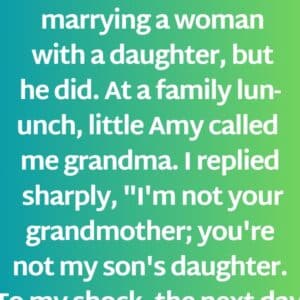Tom never liked me.
Not in the quiet, polite way some kids keep you at arm’s length. He made it clear from day one that I was an intruder in a story that already had a main character—his dad.
The first time I offered to help with college, he didn’t hesitate.
“You can’t buy my dad’s place,” he said flatly.
It stung more than I let on. Not because I wanted to replace his father—I never did—but because I wasn’t even allowed to stand in the same emotional room.
Years passed. I paid bills, fixed leaks, drove his mom to work when her car broke down. Tom grew up. He moved out. Our relationship stayed stuck somewhere between uneasy truce and mutual avoidance. He’d visit for holidays, say hi without looking directly at me, and always, always ask his mom to pass him things instead of asking me.
I got used to being the shadow in my own house.
Then he got hurt.
A shoulder injury at work, serious enough to require surgery. Even with insurance, there was a chunk left over. A big chunk. My wife sat across from me at the table, hands wrapped around a mug she wasn’t drinking from.
“Do you think we could help him with the rest?” she asked carefully.
I looked at her. At the worry lines that deepened every time Tom’s name came up. At the ring on her finger—the one she’d worn long before she met me.
“I can’t,” I said. “Not this time.”
Her face fell. “It’s his health.”
“I know,” I said quietly. “But I’m tired of being the only one reaching across the gap. If he needs help, he can ask me himself.”
He never did.
Instead, a few days later, I got a text.
“I don’t expect anything from you. Just letting you know, Mom’s selling her wedding ring to help cover what insurance won’t.”
I read it, blinked, and read it again.
My stomach dropped.
That ring.
She never took it off. Not when she washed dishes, not when we got married, not even when we had our first argument as husband and wife. It was the last piece of her life with his dad. A symbol of a chapter that ended too soon.
And she was willing to sell it.
Not because Tom asked.
Because she couldn’t stand the thought of him in pain.
I glanced over at our wedding photo on the mantle. She was laughing in it, head tilted back, ring catching the light. She’d told me once that wearing it again after being widowed had felt like betrayal—until she realized she wasn’t erasing her past, just adding to it.
Now she was about to pawn those years for her son.
The next morning, I told her I had errands. She nodded absently, eyes red-rimmed. She didn’t mention the ring. She didn’t have to.
I drove straight to the hospital.
I didn’t go to his room. I didn’t ask to see him. I went to billing, sat down in a beige chair that smelled like disinfectant and coffee, and asked them to pull up his account.
I paid the remainder.
Every last cent.
When I got home, she was standing at the kitchen counter, her ring resting in her open palm. She was staring at it like it was a person she had to say goodbye to.
“I took care of it,” I said.
She turned, confused. “What do you mean?”
“The surgery. The balance. It’s paid. He’s scheduled for next week.”
Her mouth opened, but no sound came out.
I walked over, gently curled her fingers back around the ring, and said, “He doesn’t need to know it was me. Let him think you made it happen. He’s your son.”
Her eyes filled with tears.
That night, she held on to me like someone afraid of drifting away.
A couple of days later, Tom texted her:
“Someone just paid off the bill. No idea who. The hospital says it’s settled.”
She told him maybe it was some assistance program, some charity fund. He responded with a skeptical emoji but didn’t press.
The surgery came and went. It went well.
I stayed away. I told myself it was to give him space. Truthfully, I wasn’t sure I could handle being in a room with that much history and that much unspoken resentment.
The night he came home to recover, I was on the couch pretending to watch TV.
He walked in slowly, shoulder bandaged, his mom hovering.
His eyes found me.
“Hey,” he said.
I nodded. “Hey.”
He hesitated, then walked closer. For once, he didn’t look away halfway through.
He held out his hand.
“Thanks,” he said.
I stared at his hand, then at him. “I thought you didn’t know.”
“I didn’t,” he said. “At first.” He shrugged with the good shoulder. “Hospitals keep records. I asked.”
I exhaled. “I didn’t do it to prove anything.”
“I know,” he said softly. “That’s why it mattered.”
We ate dinner together that night.
He stayed.
He laughed at a joke his mom made, then one of mine. Afterward he asked, almost awkwardly, “You want to watch the game?”
We sat side by side on the couch, the glow of the TV filling the room. It wasn’t awkward. It wasn’t forced. It was… easy. For the first time in a decade.
Weeks passed. He came by more often. Sometimes with his girlfriend, sometimes alone. The conversations shifted from polite updates to actual talks.
One Saturday, he walked in holding an old photograph.
It was a picture of his dad, grinning with a much younger Tom balanced on his shoulders. The edges were worn, corners curled.
He placed it carefully on the shelf beside our wedding photo.
“I think he’d have liked you,” Tom said quietly.
It felt like something inside my chest cracked open.
We stood there looking at the two photos side by side—his past, our present. Not competing. Just… coexisting.
Later, he asked if I could help him with something.
“There’s a promotion opening up,” he said. “They’re asking for references. I was wondering if… maybe… you could write one?”
I tried to play it cool. “Sure. Yeah. Of course.”
As we sat at the table drafting it, he stared at the blank document for a moment, then said, “Did it bother you? All those years? That I didn’t like you?”
I thought about lying.
“Yeah,” I said instead. “It did. But I figured you had your reasons.”
He nodded slowly. “I did. I was angry. Not at you. Just at… everything. You were easy to take it out on.”
“You didn’t do anything wrong,” he added. “You were just there. And I wasn’t ready for ‘there’ to change.”
I smiled. “You’re here now. That’s what matters.”
He got the promotion.
We threw a small celebration at the house. I grilled; he brought drinks. There was music, laughter, and not once did it feel like I was trespassing in someone else’s happiness.
At Christmas, he handed me a small, neatly wrapped box.
“Just something small,” he said, almost shy.
Inside was a leather wallet. Simple, sturdy. On the inside flap, stitched into a small tab, was a message:
“You were never a replacement. You were a second chance. Thank you.”
I had to look away for a second so I wouldn’t embarrass myself.
My wife wiped her eyes openly. “Best Christmas ever,” she said, voice thick.
Now, every Sunday, Tom and I get coffee.
Sometimes at the kitchen table, sometimes at the same diner he used to go to with his dad. He talks about work, his plans, his fears. Sometimes he talks about his father. I listen. I never try to compete with a ghost.
Every now and then, he’ll ask what I’d do in his situation.
And I answer, quietly honored that he cares what I think.
If you’d told me years ago that this kid—the one who once spat, “You can’t buy my dad’s place,” like it was a curse—would one day trust me enough to ask for advice, I’d have laughed.
But life has a way of softening sharp edges. Of turning grudges into gratitude. Of taking one exhausted act of kindness—one decision to quietly pay a bill—and using it as the first step across a very old, very fragile bridge.
I didn’t pay for his surgery to earn his love.
I did it because I love his mother.
Because she loves him.
And because real love doesn’t keep score. It just shows up, even when it hurts, even when you feel invisible, even when no “thank you” is promised.
Sometimes the appreciation comes years later in the form of a handshake, a Sunday coffee, or a line stitched inside a wallet.
Sometimes it never comes at all.
But when it does, it’s worth every silent sacrifice.
So if you’re sitting in the background of someone’s life, feeling unappreciated, wondering if it’s worth staying kind… don’t underestimate what your consistency is doing, quietly, in their heart.
You might just be their second chance, too.





